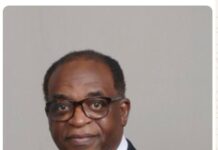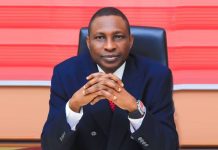 In his book, Spiritual Leadership, J. Oswald Sanders asked: “What do we mean when we use the word leadership? If I were asked to define it in one single word, the word would be influence.” According to him, “The late President Henry Truman often referred to leaders as people who get others to do what they don’t want to do- and make them like doing it.”
In his book, Spiritual Leadership, J. Oswald Sanders asked: “What do we mean when we use the word leadership? If I were asked to define it in one single word, the word would be influence.” According to him, “The late President Henry Truman often referred to leaders as people who get others to do what they don’t want to do- and make them like doing it.”
The above quotations are relevant to the unfolding scenario in Bayelsa State. It is needless to recap the events that led to the emergence of Henry Seriake Dickson as the governor of the state because doing so would be tantamount to shedding crocodile tears. That is now history,as there appears to be a new attitude towards governance and following in the glory of the Gloryland.
My first contact with Bayelsa State was at its creation in October, 1996, 16 years ago. At that time, my brother and good friend, Professor Steve Azaiki, was the pioneer commissioner for agriculture in the state. The only road in and out of Yenagoa then was the Mbiama Road coming straight from the East-West Road and tearing through the heart of the State Capital.Since my first visit in 1996, I had been a regular visitor to the State until late 2005 when Azaiki, who had served for two terms as Secretary to the State Government, “stepped aside”.
However, two Saturdays ago, I had the privilege to return to the state to attend the wedding ceremony of the son of my good friend and two-term Senator Emmanuel Paulker.That morning, I flew to Port Harcourt from Lagos with the 7.15am flight, while Azaiki left for Port Harcourt from Abuja about the same time in the company of Navy Captain Caleb Omoniyi Olubolade, the police affairs minister, who represented Mr. President at the wedding.
After the normal airport procedures, we headed for Yenagoa, through the East-West Road, which has been permanently under construction. For years, I have read a lot about the terrible state of the road as many travellers recount their nightmares on the road. It was my turn that day.
At the Omagwa end, shortly after leaving the airport, the long queue of vehicles, most of them oil tankers and articulated trucks, was frightening. Even the Hilux used by the police escort, almost got stuck as it maneuvers in and out of marshy swamps and pot holes which could swallow a whole bungalow in an attempt to escape from the traffic gridlock. Since I was in the second vehicle trailing the minister who was seated with Azaiki, I was unable to get his comments at that time.
As the convoy entered Yenagoa, I saw a transformed city. It had been expanded to the left, right and centre of what used to be a small community. In those days, I could drive to the Government House all alone, but on this day, if I must confess, I got lost as more and more houses of various kinds had sprouted up within the city.
The Minister’s first port of call was the office of the deputy governor Rear Admiral John Jonah Gboribiogha(rtd). When the deputy governor sighted Azaiki coming behind Olubolade, he simply retorted, “Ha, you came with your commissioner.” Azaiki was three-term Commisioner for Agriculture under Ayeni, Olubolade (both Navy Captains) and Edor Obi,an army Colonel, before he was later appointed as Secretary to the Government in 2002.
After a brief stay with the deputy governor, he volunteered to lead the minister and his entourage to his boss. We met the governor dressed in a white short and T-shirt with a fez-cap to match. Apparently, he had just arrived from the monthly ritual of jogging to keep fit alongside civil servants and others in the state.All three of us were ushered into our seats before the deputy governor took his leave.
/////////////////////////////////////
“Dickson has clearly demonstrated that good governance, itself, is a total package and it is not limited to physical projects alone”
//////////////////////////////////
Since I was meeting the governor one-on-one for the first time, I seized the opportunity to throw some questions at him. First was the adoption of a flag and national anthem by the state which had attracted controversy. His answer was: “Yes, have you noticed that so many states have done that in the past and it was only when Bayelsa did its own that people started making a molehill out of nothing?” In his opinion, what they have simply done is what other nationalities have done for a very long time. The Ijaws are people trying to reposition themselves and see themselves as part of this nation. “People are only reading meanings to a simple thing because the President is from here. Even if he were not from here, we could still have done the same thing. We are a people, and we need to defend our heritage and identity.”
We also spoke on quite a lot of issues ranging from sustainable governance, his vision for the stateand all that. Considering the fact that it was an impromptu meeting, the governor’s grasp of issues, his understanding of contemporary development in the nation’s polity, his vision and idealism were amazing.
The governor comes across as someone who possesses critical leadership values that are necessary to assist him to drive the levers of government in the state. Already, there is a paradigm shift as he embarks on a realistic restructuring of the bureaucracy of governance. In this regard, the governor said he has put in place an ambitious template both for himself and the people of the state. According to him,“the government must meet the yearnings and aspirations of the people, while the people too must hold the governor and other officials of government accountable for their actions at all times.”
This, the governor said, he hoped to achieve through the various legislations already passed by the House of Assembly. Theseinclude,Bayelsa State Income and Expenditure Transparency Bill,Bayelsa State Fiscal Responsibility (Amendment) Bill,Bayelsa State Government and Local Government Compulsory Savings Bill, among others.
Just like the country’s vision 2020, the governor said he has set a target for the state to be the third most developed state in Nigeria by 2022. What an ambitious target in such a landlocked state where it costs a fortune to develop infrastructure and get the state going. I am sure the governor knows quite well that in order to achieve his optimum for his people, he must stamp out corruption and entrench accountability. This was probably why the “Transparency and Accountability Bill” was one of the first bills he sent to the House on assumption of office.
The governor’s vision and idealism are encapsulated in his “Restoration Agenda”. To get his people to change their old ways, he has embarked on a set of new values to create a new people that will be development-oriented, while shunning evils like cultism, militancy and the rest, which have seemingly retarded the progress of the state for a long time.
InMemoirs of Field Marshal Montgomery, Bernard L Montgomery said, “Leadership is the capacity and will to rally men and women to a common purpose, and having the character which inspires confidence.” Therefore,it is apt to state that the Bayelsa governor has unleashed unstoppable machinery for the total regeneration of the state. This he is doing by nurturing formidable institutions, popular participation and consensus building.
Dickson has clearly demonstrated that good governance, itself, is a total package, and it is not limited to physical projects alone. There are other parameters through which good governance can be put in place. But when one considers where the state is coming from, one would agree that he has started well. There is no doubt that he loves Ijaw people, and he is ready to defend them wherever they may be. One only hopes that the current tempo would be allowed to endure!



